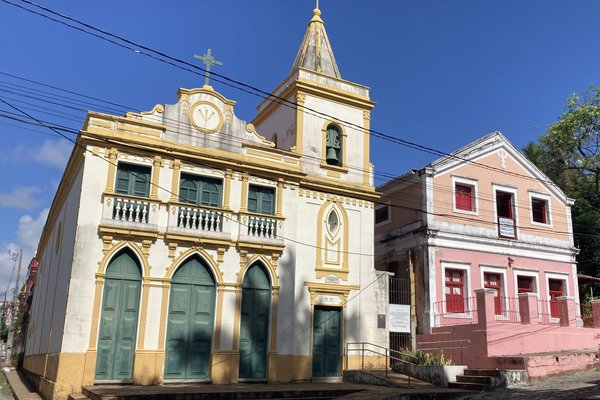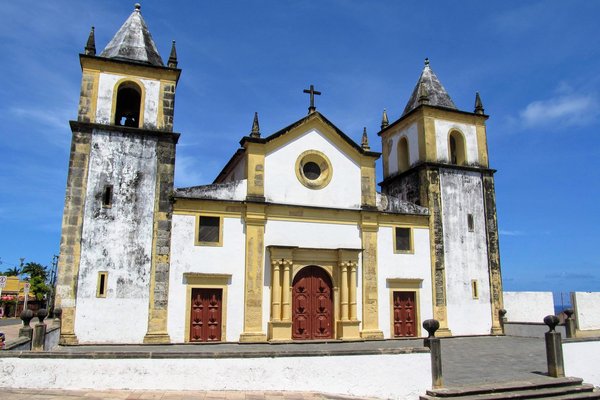Brazil
Olinda
The Historic Centre of the Town of Olinda has maintained its colonial urban fabric from its heydays when it was a centre of the sugarcane industry.
The town was built on hills overlooking the Atlantic Ocean. It is dominated by rich religious and public buildings, many painted in vivid colours, and includes lots of greenery. Among these are 20 baroque churches, chapels and convents.
Community Perspective: a fairly small, typical Portuguese colonial town. The highlight is the Franciscan convent with its azulejos.
Site Info
Official Information
- Full Name
- Historic Centre of the Town of Olinda (ID: 189)
- Country
- Brazil
- Status
-
Inscribed 1982
Site history
History of Olinda
- 1982: Advisory Body overruled
- ICOMOS advised Deferral for better comparative analysis and guarantees on rapid urban development of Recife
- 1982: Inscribed
- Inscribed
- Type
- Cultural
- Criteria
- ii
- iv
Links
- UNESCO
- whc.unesco.org
- Official
-
- olinda.pe.gov.br — Olinda
All Links
UNESCO.org
- whc.unesco.org — whc.unesco.org/
Official Website
- olinda.pe.gov.br — Olinda
Community Information
- Community Category
- Urban landscape: Colonial
Travel Information
Recent Connections
-
Rococo
Chapel of Saint Anne in Franciscan mona… -
Astronomy and Astrology
The Alto da Sé Astronomical Observatory… -
Poetic Quotations
Olinda is all for the eyes it's not ta…
Connections of Olinda
- Individual People
-
-
Charles Darwin
"The channel by which we went to and returned from Olinda was bordered on each side by mangroves", visited from Aug 12 1836 -
Mapped or Illustrated by Blaeu
On top frieze of "Americae nova tabula" (1617)See luna.folger.edu
-
- Geography
-
-
Atlantic Ocean
"Founded in 1535 on hillsides overlooking the Atlantic Ocean on Brazil’s northeast coast" (OUV)
-
- Trivia
-
-
Built or owned by Dutch
In 1630, the Dutch invade Olinda and dominate Pernambuco. The dominance lasted from 1630 to 1654. -
Built or owned by Portuguese
The settlement of Olinda was founded in 1535 by Duarte Coelho Pereira, a nobleman, military leader, and colonial administrator in the Portuguese colony of Brazil (wiki)
-
- Architecture
-
-
Rococo
Chapel of Saint Anne in Franciscan monastery: "has a panel of tiles from the golden rococo period" (text on sign at the chapel) -
Urban fabric
"a tree-covered landscape laid over an urban fabric delightfully moulded to the contours of the topography" -
Baroque
about twenty baroque churches (OUV) -
Glazed tiles
Fine azulejos at Igreja da Misericórdia and at Convento de Sao Francisco
-
- Religion and Belief
-
-
Jesuit Order
Jesuit College -
Jewish religion and culture
Rua dos Judeus - site of first synagogue in the Americas 1641. During the Dutch rule there was a lot of religious freedom, and many Sephardic Jews originally from Portugal migrated to Olinda. With the return of the Jewish-unfriendly Portuguese rule in 1654, the Jewish community was given 90 days to sell off their goods and leave on the first available ship. Many of the houses built by Jewish merchants still stand today on what was once called "Rua dos Judeus" (Jews' Street), -
Franciscan Order
Franciscan Monastery -
Cathedrals
Cat metro Sao Salvador -
Carmelites
"It is dominated by the.. convents of the Franciscans, Carmelites and Benedictines" (OUV) -
Benedictines
"It is dominated by the.. convents of the Franciscans, Carmelites and Benedictines" (OUV)
-
- Human Activity
-
-
Festivals
Carnival -
Slavery
The city is built on wealth from sugar grown and harvested by slaves in the plantations of Pernambuco. In the Praça da Abolição (Abolition Square) is a statue of Princess Isabel, who, in 1888, signed the Lei Aurea (Golden Law) abolising slavery in Brazil. She did this as regent whilst her father Pedro II travelled abroad. The law (signed in Petropolis) was promulgated in this square.
-
- WHS on Other Lists
-
-
World Monuments Watch (past)
Historic Olinda and the Convent of San Francisco (2006, 2004)
-
- Timeline
-
-
Built in the 18th century
essential urban fabric of Olinda dates from the 18th century
-
- Science and Technology
-
-
Astronomy and Astrology
The Alto da Sé Astronomical Observatory is an observatory located in the city of Olinda, Pernambuco, Brazil. It was built near the place where, on February 26, 1860, the French astronomer Emmanuel Liais observed and described the comet Olinda (C/1860 D1), being the first comet discovered in South America and in Brazilian territory. (wiki)See pt.wikipedia.org
-
- Literature & Film
-
-
Poetic Quotations
Olinda is all for the eyes it's not tangible, it's all desire. No one says, "That's where I live." They just say, "That's where I see." -- Celebrated Brazilian poet Carlos Pena Filho, in his poem Olinda (source: wikivoyage)
-
News
No news.
Recent Visitors
Visitors of Olinda
- Adrian Turtschi
- Alejandro Lau
- Alexander Lehmann
- Alex Marcean
- Ali Zingstra
- Alvaro1404
- A. Mehmet Haksever
- Ammon Watkins
- Atila Ege
- Bill Maurmann
- Carlos Sotelo
- Cirene Moraes
- edstar500
- Els Slots
- Erfe91
- Erik Jelinek
- Fan Yibo
- Felicité
- Harry Mitsidis
- Iain Jackson
- Jarek Pokrzywnicki
- João Aender
- Jon Opol
- kiank37
- Kjlauer
- Krijn
- Kurt Lauer
- Liamps91
- Loic Pedras
- Luis Filipe Gaspar
- Michael Ayers
- Michael Novins
- Monica Tasciotti
- Niall Sclater
- Nihal Ege
- Patrik
- Pieter Dijkshoorn
- Rafabram
- Reza
- Roger Ourset
- Roman Bruehwiler
- Sclowitz
- sibariam
- stephanvermeulen
- Thomas Buechler
- Thomas van der Walt
- Timothy C Easton
- Vanessa Buechler
- Zoë Sheng
Community Reviews
Show full reviews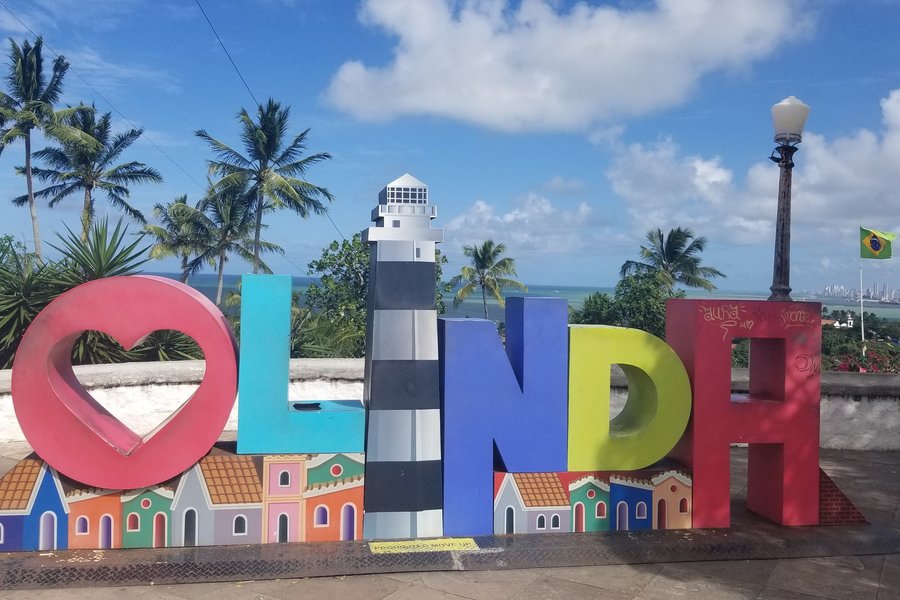
It's hard to skip Recife if you are traveling around Brazil and Olinda is a suburb, or another city?, of Recife. It has its own charm for sure. After the bustling or slum-like Recife you get a chilling attitude of the locals. It was also a sunny day, which I suppose isn't surprising.
I parked my car at the east side of the main square which has free parking. I believe it's near an old club which is now closed. I think most of the area is free but I wanted to avoid the touts and I got that right. As soon as you walk up the road there will be people approaching you about doing a local tour. As I don't speak Portuguese and I didn't dress like a tourist they weren't very persist though, or maybe I don't look like I have lots of money lol. I took the steep road up to St. Francis Convent which wasn't open yet so I walked around the neighborhood first to see the sights. At the top of the hill you get the main piece: the lookout. All the local buildings don't matter much if one can see just that. There is a convent up here too but I gave it a miss because a) it wasn't highly recommended for one and b) it's more beautiful from the outside. There are other smaller buildings to see as well. One can also just sit up here and relax in the sun. There …
Keep reading 0 comments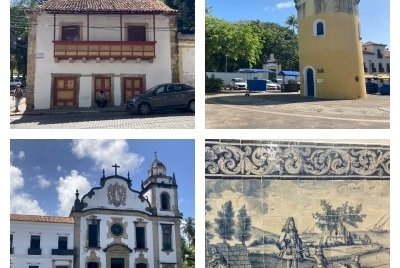
Olinda is your typical cute colonial town, as there are so many in Latin America. Colourful houses, cobblestone streets, adorned with too many churches (Baroque of course!) for its size. I stayed there for 3 nights right in the core zone at the Hotel 7 Colinas, a splurge as I am now halfway through my tour of Brazil. It has lush gardens, a swimming pool, and a decent restaurant.
The town was rebuilt by the Portuguese after the Dutch burned it to the ground in 1630, so most of what you see dates from the late 17th or 18th century. It seems to have no street plan at all: roads are steep, with uneven cobbled stones, and are scattered across the hills. And it is bloody hot!
Buildings here are protected by fences and dogs, a security feature that I only started to notice since arriving in Recife – the North of Brazil that I had experienced so far (from Manaus to Sao Luis and Fernando de Noronha) was very relaxed. A few sketchy people hang about in Olinda’s mostly empty streets (again: hot!), and hawkers will try to sell you a painting or a guided tour of the city. Several of the houses carry a sign that they are for rent during Carnival, a major festival here in Olinda.
I walked around for 2.5 hours in the early morning and I think I have seen most of it. Noteworthy buildings are the Sao Bento Church (1761), …
Keep reading 0 comments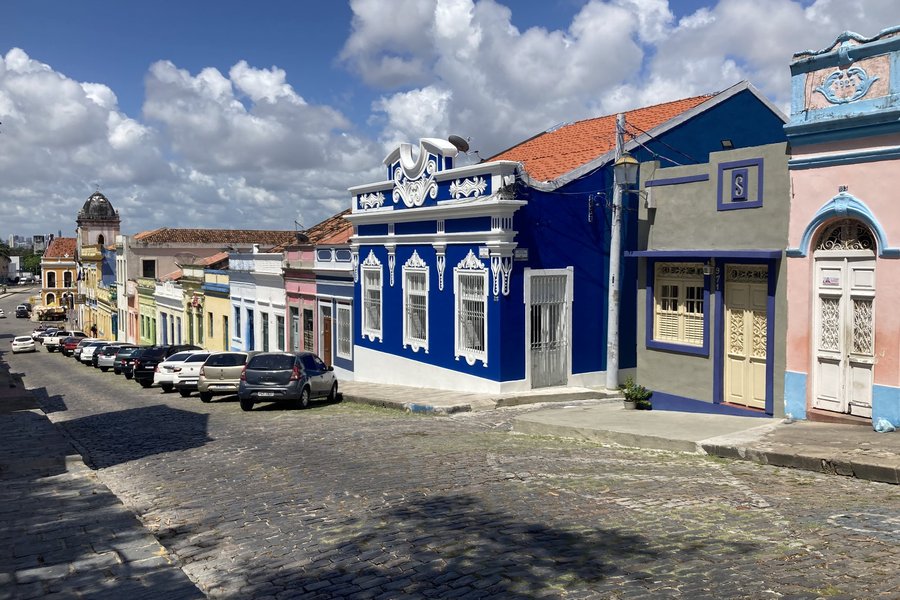
The streets are a real invitation to go back in history and imagine those streets in past centuries. The buildings are well maintained, the streets are safe, and there are extremely hospitable people.
Keep reading 0 comments
Olinda is a town founded during portuguese colonization in northeastern Brazil. It lies only a few kilometers from the capital of the State of Pernambuco, Recife, and has many churches and buildings from the 17th and 18th centuries, all framed by the blue ocean that can be seen from its hilly cobblestone lanes. Olinda reaches its pinnacle during carnival, but all over the year is a charming place to visit.
Olinda was burnt down by the Dutch during their conquest in the 17th century, but has been entirely rebuilt after the Portuguese reconquest and not much has changed since then in its historical centre.
Recife, the neighbour city, has plenty of attractions and also an international airport that make it easier to visit both cities.
Keep reading 0 comments
I visited Olinda in early February 1993. That date will tell those who know Brazil that preparations for Carnival were in full swing. The streets were often blocked by samba bands practicing their routines, some already in full fantastic dress. It was my first stop on my first visit to Brazil (having flown to the adjoining city of Recife from Paris).
The weather was hot and sunny with some scattered cloud.
Olinda was for some time the capital of Pernambuco and, spread out over some small hills, has a considerable number of fine buildings (mostly churches).Many were in desperate need of repair when I was there.
The historic area is not large and a pleasant couple of days can easily be passed wandering through streets of brightly painted houses, visiting the several museums and browsing the many excellent handicraft shops (small highly coloured terra cotta figures a speciality)
Like many Brazilian cities Olinda has a reputation for muggings but apart from a few, easily deterred, would-be guides I received no unwanted attention and much enjoyed my time there which made for a gentle introduction to this vast and diverse country.
Keep reading 0 comments
